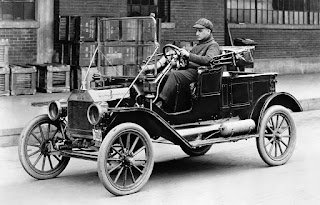Be better? Or be different...? AMP Work Blog No. 4
Legend has it that Henry Ford once said, if I had asked what people wanted, they would have said, faster horses (instead of a car). In a similar vein, Steve Jobs famously said, people don't know what they want till you show it to them!
I think the point is not so much that we don't need to listen to our customers. Rather, we shouldn't depend on our customers to give us the solution. One of the AMP faculty put it well - customers are not so good at telling us what the solution is. But they're great at articulating what the problem is! So our job is to listen, and then we figure out the solution to our customers' problems (and for the avoidance of doubt, I mean both external and internal customers, especially in the case of support units).
Yet when we go about our 'customer engagement', it's so easy to fall into the trap of asking questions like "What can we do better", "How would you like us to change" and "What can we do for you?".
Notice how these questions are all focused on ourselves - we, we, we. But it's not the customer's job to think up the answers for us - it's ours! Could it be that our engagement needs to be more along the lines of, "what's your no. 1 priority?", "why is [business X] the most important to you?", and "what's your biggest obstacle in succeeding at business X?". You, you, you.
I can just imagine how we might spend weeks agonizing over how to make customer engagement survey questions better - instead of "what can we do better", let's ask "what can we do better, in relation to the specific issue of [X]?" While that could certainly be an improvement, it would only be incremental. But by flipping the approach altogether to ask "what is your priority?" a whole new vista of opportunity opens up.
It's been said that there are two ways to win - be better, or be different. And don't get me wrong - getting better incrementally is very very important. But do we spend too much time figuring out how to be better, when perhaps we've reached the stage where there's more opportunity in exploring how to be different?
=====
In an interesting example, it was pointed out that traditional furniture shops, over the years, have tried to sharpen their business model, to get better and better at it. You want choice? OK we build expensive showrooms, give you lots of choices. Oh, now you need advice to make your choice? OK, we'll hire in-store designers to advise you. Oh, now the designers' ideas are too bespoke? OK, we'll custom-make, assemble and deliver. Oh, now the cost is too high? OK, we'll offer you financing schemes. Oh, now the whole experience is too complicated? Oh... you've gone to IKEA's quirky low-cost self-service flatpacks, come back!!!
But IKEA isn't actually better. They're just... different.
In a maturing market, every little enhancement we make gets more and more expensive, with less and less return, as customers' expectations inch up at the same pace, and competitors find it easier and easier to copy. At some point, all the competitors look the same, the product or service becomes a generic commodity, and the only lever left to pull is price, which results in a mutually destructive price war.
Perhaps we need to take a good hard look at what we spend our time and effort on. Are we at risk of engaging in a flailing spiral, coming up with more and more new and incrementally 'improved' iterations of the same thing (think, the vast assortment of Nokia's now extinct models vs Apple's singular "Think Different" iPhone. And now consider - will iPhone sales start to tail off, now that they've gone through incremental iterations 1 through 8 - and will X be truly different)?
Instead of growing incrementally in every which direction, are we looking at who our customers are, who we are, where the voids are, and getting a laser focus on differentiating ourselves - being not merely a little better, but rather distinctively different, with our service, our product and our people, to fill those voids? I encourage all of us to dare to experiment!
=====
And on a personal application note - many of us strive each day to be better than we were before. That's great. But at some point, incremental "better"s have diminishing returns, and we need to explore "different".
As a simple example, you might decide, my daily schedule is so busy, I'll work an hour more at the end of each day to clear my work. Then if that's not enough, 75 mins. Then 90. Then 105. But maybe the solution is to go different - leave home 15 minutes earlier, get to office 30 mins earlier (because no traffic jam), clear work 60 minutes faster (because nobody's bugging you for meetings early in the morning) and end up going home 75 minutes earlier!
Or you might think, I want to be a more joyful person, with a bigger heart. I signed up for 1 charity activity last year. So this year I'll do 2. Then if I still don't feel any difference, try 3. Or, I gave $50 last year, this year I'll give $75, and if that doesn't work, $100 next year.
That is a great start, but let's be honest - at some point, the incremental change doesn't really change very much in terms of your life happiness, or for the people you're trying to help. So go different.
Try this - find someone specific in need, tell yourself and that person, I want to be part of your life. Don't ask "what can I do for you?" (bringing this blog full circle!) but "what's the most important thing in your life?" And go from there! Because more than the mere words on any blog, this is what really makes a difference to people.
Try this - find someone specific in need, tell yourself and that person, I want to be part of your life. Don't ask "what can I do for you?" (bringing this blog full circle!) but "what's the most important thing in your life?" And go from there! Because more than the mere words on any blog, this is what really makes a difference to people.
You yourselves are our letter, written on our hearts, known and read by everyone. 2 Corinthians 3:2










Comments